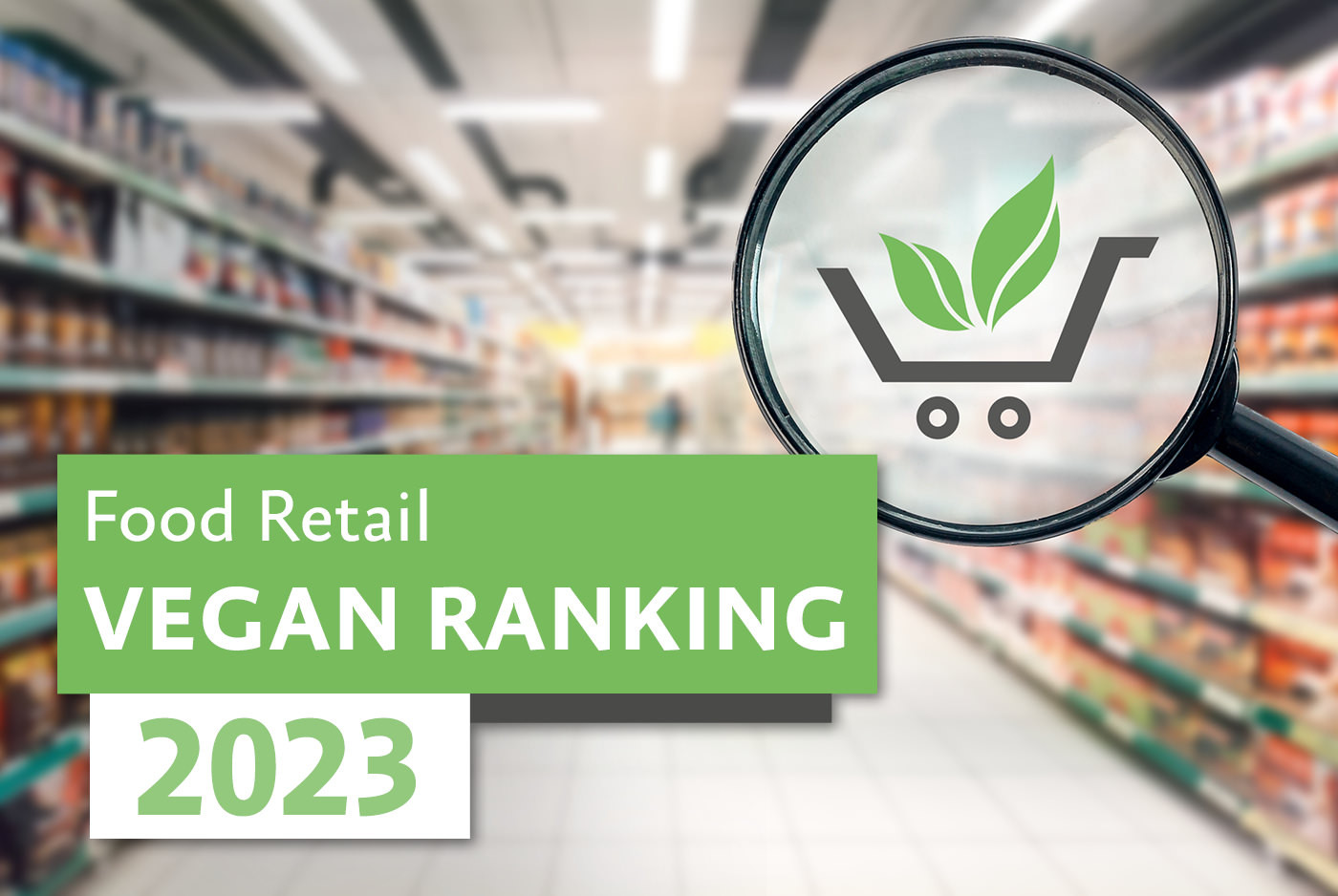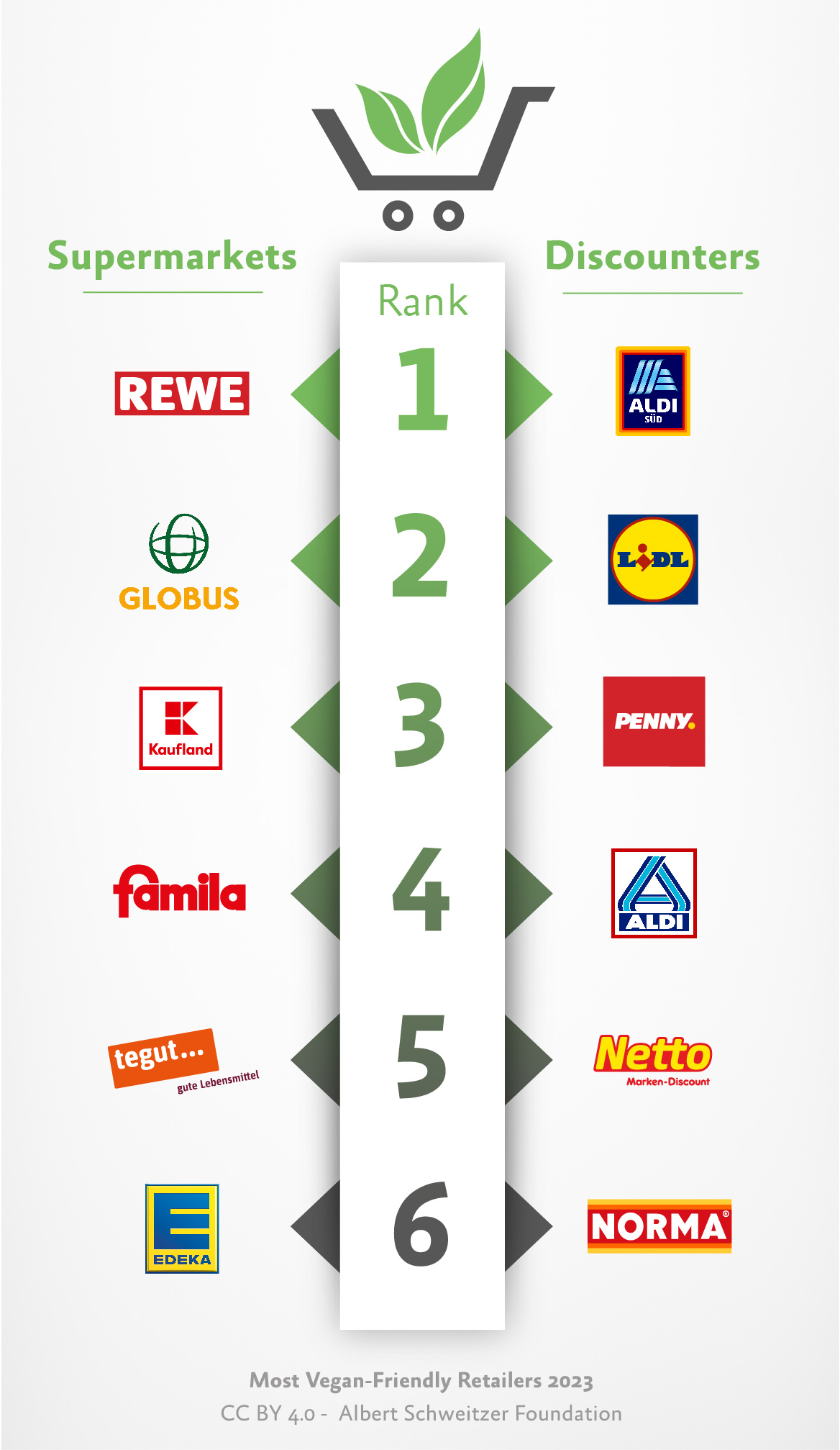

This year marks the fourth iteration of our ranking initiative for the most vegan-friendly retailers. Its goals are to make it easier for consumers to find plant-based alternatives and to encourage companies to expand and improve their vegan product range. We took a close look at major food retailers and evaluated the scope of their vegan product range. The companies' marketing and future strategies were also included in the analysis. The result? Rewe and Globus top the ranking for full-range retailers, while Aldi Süd and Lidl stand out in the discounter segment.
You can download our detailed ranking reader here [in German].
The results at a glance
The demand for plant-based products has increased enormously in recent years. Our findings demonstrate that the food retail sector has responded by expanding their range in all the product categories analyzed. The increase in vegan products has been particularly strong for not only meat and fish alternatives but also ready meals. We can also see major progress regarding milk alternatives, and the picture is quite mixed when it comes to sweets, baked goods, snacks, sauces and dips.
We are delighted that, by offering plant-based products, many companies in the food retail sector are not—or no longer—focusing exclusively on the small vegan target group. Instead they want to make plant-based foods attractive to all customers.This is reflected in the marketing strategies of some of the companies. Other companies, however, are sticking to outdated ideas and still exclusively target the vegan niche—or do not place any emphasis whatsoever on reducing the proportion of animal products in their range.
Conclusion
When we first performed this ranking initiative back in 2015, it was possible for retailers to achieve high positions in the ranking simply by offering innovative vegan products in certain categories. A lot has changed since then: Today, supermarkets and discounters offer a much greater variety of plant-based products than ever before. We very much welcome this development.
We are excited to see how the plant-based offering in food retail will develop in the coming years. It is clear that companies cannot afford to rest on their laurels and will be forced to expand their current range in order to exploit the great potential of plant-based products and avoid falling behind in the competition.
The ranking in detail
Results for the supermarkets
1: Rewe
Rewe has significantly expanded its range of plant-based products which now accounts for a relatively large proportion of its total range. In fact, the company has since started to lead the way in the categories where it was still scoring poorly as recently as 2019. Rewe is particularly well- to very well-positioned when it comes to meat and milk alternatives and has significantly expanded, for example, its range of ready meals, cheese alternatives and ice cream. Rewe also earned points for strategy and marketing. It still has some catching up to do when it comes to sauces, snacks and certain convenience categories.
Results for the discounters
1: Aldi Süd
After Aldi Süd dropped from 1st to 2nd place in the last ranking, the company is now back at the top in our discounter ranking. At Aldi Süd, plant-based products account for a relatively large share of the overall product range. The company offers a good range of plant-based ready meals, snacks and sauces, but still has some catching up to do when it comes to meat and milk alternatives. In terms of strategy and marketing, Aldi Süd has a variety of good approaches in place.
How was the data collected?
Our evaluation is based on the following two pillars: »vegan product range« and »strategy and marketing«. In February 2023, we gathered data in five stores of each company throughout Germany in order to obtain an overview of the range. In addition, we conducted a survey among the companies to establish which strategies they are pursuing in order to expand their plant-based product range and reduce animal products. We then combined the results for both pillars and ranked the companies from 1 to 6 based on their overall score. We analyzed discounters and supermarkets separately because discounters have a smaller product range overall but, in turn, considerable flexibility in shaping their offering thanks to their store-brand products.
What did we evaluate?
Vegan product range
When compiling the ranking, we focused on selected food groups where currently many animal products are still used and so offer excellent potential for more plant-based ingredients:
- Plant-based alternatives to meat, sausage and fish
- Plant-based alternatives to dairy products
- Plant-based ready and semi-ready meals
- Plant-based sweets, baked goods and snacks
- Plant-based spreads and sauces
The food groups were weighted differently in the evaluation. Plant-based alternatives replacing products with a high proportion of animal ingredients were assigned special importance. These include meat and milk alternatives as well as products such as ready meals, which, in addition, offer a high degree of convenience for customers. Snacks, sauces and baked goods were given slightly less weight. With these products, small changes in the ingredients can lead to big reductions in the quantity of animal products used, which means that there is great potential for simple recipe adjustments and strong growth in this category in the coming years.
Strategy and marketing
The results of the »strategy and marketing« pillar are based on a survey in which the companies were asked about a range of topics. Among other things, we wanted to know what the companies’ target groups are; how they ensure that vegan products find their way easily into the customers’ shopping carts; and how promotional offers for plant-based products are designed. We were also interested in the companies’ concrete goals for expanding their plant-based product range, reducing animal products and using labels.